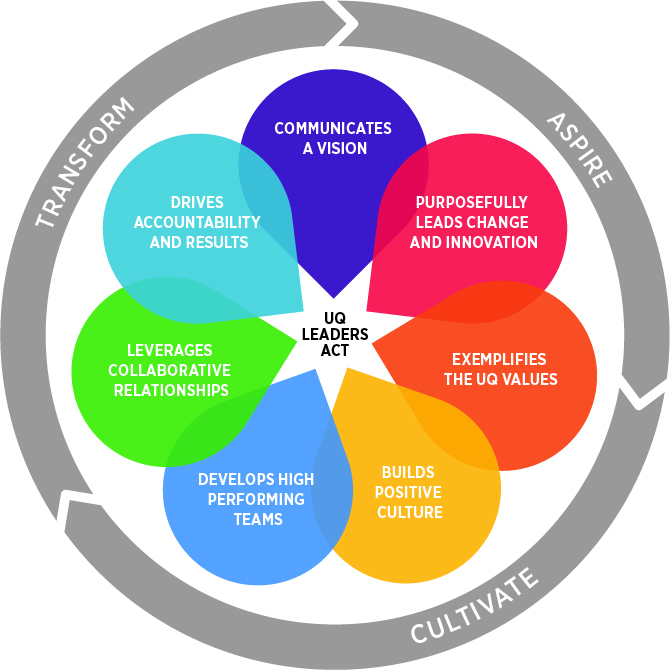Leadership Development at UQ
Leadership is a practice through which individuals use their influence to mobilise people and resources toward a shared goal.
At UQ, we recognise that leaders can be born, but more often they must be made. As an organisation, we strive for a culture of leadership that is collaborative, respectful, and inclusive.
We promote leadership that supports individuals and teams to do their best work in service of our broader UQ community, at all levels throughout the University.
Leadership development programs
We recognise the need to support leaders in working toward their career progression and development goals. This not only affords our leaders opportunities for growth, but supports our organisation’s goal of attracting and retaining the best and brightest people.
Our suite of targeted programs offers access to a range of development opportunities, including both theoretical and experiential learning opportunities for leaders at all levels.
Learning to Lead
Designed for aspiring leaders, providing foundational learning to lay the groundwork for those who are preparing to undertake their first leadership role.
- Eligibility guidelines: Professional staff HEW 4 to 6, and academic staff levels A to B
- Upcoming in person sessions: 18 April, 8 May, 2 July, 18 September, 21 October, 21 November
- Upcoming virtual sessions: 6 June, 20 August
Find out more about Learning to Lead
Leadership in Practice
Targeted toward first time or emerging people leaders, who are building their knowledge and skills, broadening their awareness of self, and enhancing their ability to lead others.
- Eligibility guidelines: Professional staff HEW 6 to 8, and academic staff levels B to D, who currently have people leadership responsibilities
- Upcoming in person sessions: 29 - 30 April, 15 - 16 May, 30 - 31 July, 12 - 13 September
- Upcoming virtual sessions: 20 - 21 June, 28 - 29 October
Find out more about Leadership in Practice
Leading UQ
Our flagship program, Leading UQ, is designed for experienced leaders who are consolidating their approach to leadership, challenging their perspective, expanding their self-awareness, and optimising their leadership practice.
- Eligibility guidelines: Professional staff HEW 9 to 10, and academic staff level D and E, who have portfolio leadership responsibilities
- Upcoming sessions:
Cohort 1 Program Dates:
8 July, 15 & 16 July, 2 & 3 September, 31 October 2024Cohort 2 Program Dates:
8 July, 18 & 19 July, 5 & 6 September, 31 October 2024
Participants are expected to attend all program dates for their nominated cohort.
Find out more about Leading UQ
Manager's Toolkit
A range of online learning programs for new managers or those looking to refresh their knowledge. Programs are designed to provide practical, knowledge and process-based learning across a range of key operational areas.
- Eligibility guidelines: New-to-UQ managers at all levels
- Upcoming sessions: Available on demand
Leadership Resources
A carefully curated list of optional online courses, articles, and videos designed for leaders at all levels, to uplift leadership knowledge and skills across the seven capabilities in our UQ Leadership Framework.
Access the Leadership Resources
Programs in development
Following the first release of leadership programs within the suite, a number of additional offerings that are currently under development will launched, including:
- Heads Up: A series of targeted, co-created learning opportunities for Heads and Deputy Heads of School, Institute Directors and Deputy Directors.
- Executive Development: A bespoke, one-to-one development opportunity for executive staff.
The UQ Leadership Framework
Our approach to developing and supporting leaders is outlined in the UQ Leadership Framework. This framework articulates the capabilities expected of all leaders at UQ, and demonstrates our commitment to supporting leaders at all levels, from aspiring through to Executive.
Can't find the answer?
Check the status of your requests and enquiries in my.UQ dashboard.

